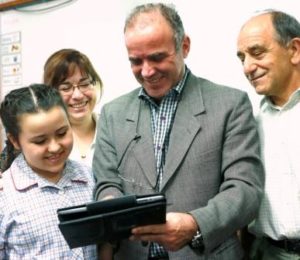
Building on the success of its online Modern Greek programs at tertiary level, Flinders University is moving to develop learning modules suitable for language students in South Australian primary and secondary schools.
Professor Michael Tsianikas, Director of Flinders University’s LOGOS Australian Centre for Hellenic Language and Culture, said LOGOS is seeking funding to support the initiative, which could eventually be extended to schools nationally.
The plans gained momentum with the recent visit to Flinders by academics from the Centre of Migration and Intercultural Studies at the University of Crete, which is a pioneer of online Greek language teaching.
Associate Professor Aspasia Hatzidakis and Associate Professor Giannis Spantidakis presented at a seminar at Flinders attended by more than 30 teachers of Modern Greek from public, independent and ethnic schools. The seminar highlighted a new electronic learning environment for the study of Modern Greek funded by the European Union that allows students and teachers to engage in interactive and multimodal learning tasks promoting language learning.
“It also gives teachers and students the opportunity to become part of a community of learning through global learning networks and to use what they have learned in creative ways and in ways that have meaning for the learners,” Professor Tsianikas said.
The visiting scholars from the University of Crete also visited Adelaide High School and St George College in Thebarton to talk to staff and students, and met with curriculum leaders from the SA Department for Education and Child Development.
Professor Tsianikas said the ongoing collaboration between LOGOS and the University of Crete aims to create a cohesive progression of Modern Greek language and culture learning for all levels of study from junior primary to tertiary levels.
“In designing online courses for Australian schools, we need to consider local curriculum and assessment requirements, and we would also want to give the learning immediacy by adapting materials to the Australian cultural context,” Professor Tsianikas said.
“We have evidence of a strong demand for such a program, and plans for an online course have been greeted with enthusiasm by language teachers in South Australia and beyond.”
Professor Tsianikas said the schools program would build on Flinders’ leading role as a an online language provider: the tertiary program in Modern Greek is now available at Charles Darwin and Griffith universities as well as South Australia’s three universities, and also to anyone else interested in studying Greek online, nationally and internationally.
“Online learning offers a flexible and effective way to contribute to the preservation and propagation of Greek language and culture in Australia, a country which has among the highest numbers of people with Greek heritage in the world,” Professor Tsianikas said.
“This is the best national solution for Modern Greek – and other languages – in order to make languages available to everybody, everywhere and at any given time.”

